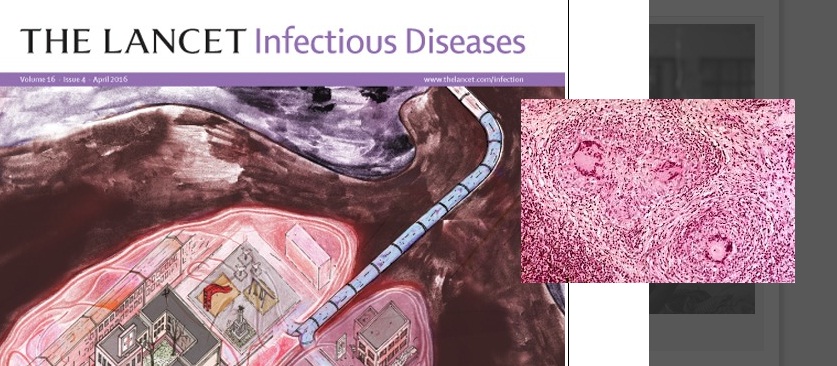Tuberculosis, which had been declining for many years, has made a comeback. This is what the Robert-Koch-Institut (RKI) in Berlin announced at World Tuberculosis Day 2017, pointing the current migration movements as a new vector in spreading the disease.
Researchers from the National Reference Centre (NRZ) at Borstel, have discovered a Europe-wide outbreak of a multi-resistant strain of tuberculosis, Die Welt reported. The strain showed a remarkable resistance to at least four different antibiotics.
The increase of cases involving persons with a migration background have compelled NRZ scientists to conduct further research.
Migrants are generally screened for communicable diseases on entry, a requirement as stated in paragraph 62 of German Asylum Law (AsylG). This includes an X-ray of the respiratory tract, which can determine a tuberculosis infection. But only ten percent of the people who are infected with the pathogen become ill — half of them in the first year after infection, the other half even later.
Since the law for protection against infection (IfSG) was introduced in January 2001, numerous characteristics of each tuberculosis patient were recorded and, in anonymised form, transferred by the 400 health offices in Germany via the 16 state offices to the Robert Koch Institute.
The research center at Borstel made their findings known in the professional journal The Lancet for Infectious Diseases when researchers from Schleswig-Holstein and their colleagues at the National Reference Center for Mycobacteria (NZM) in Switzerland identified a hitherto unknown tuberculosis pathogen in 2016.
The journal is recognised for providing a global, authoritative, and independent forum for the highest quality infectious diseases research and opinion, covering such areas as antibiotic resistance, emerging infections, and public health.
The molecular-biological examination in combination with patient interviews enabled the scientists to partially reconstruct the chain of infection. The data pointed to infection before the arrival in Europe, in a Libyan refugee camp at Bani Walid.
It is likely that the strain developed from a clone of a tuberculosis strain that is common at the Horn of Africa. All 29 patients from seven European countries had migrated to Europe via the Horn of Africa.
“The patients are mainly unaccompanied underage refugees who registered in Baden-Württemberg,” says Dr. Katharina Kranzer, chief of the NRZ at Borstel. But as the outbreak was still ongoing, more cases might surface.
In September 2015, in what has been the largest influx of migrants to Hamburg until now, nine people were taken to the University Hospital Hamburg-Eppendorf (UKE) as a precaution. A paramedic had noticed, in a tent at the main train station, symptoms of the highly infectious disease in three migrants.
“It was only through analysis of the genome that the strain of the outbreak was unambiguously identified,” says Professor Stefan Niemann, author of the study and leader of the research team for molecular and experimental mycobacteriology at the Borstel research center, and the tuberculosis department at the German Center for Infectious Research. “But in order to be able to fully benefit from the advantages of this technology it needs to be incorporated into routine screening and monitoring for tuberculosis.”
Niemann refers to himself and his colleagues as “genome detectives”, as they have been analyzing the genome of the tuberculosis bacterium. “In order to be able to determine the tuberculosis strain, we have developed a quick test,” says Niemann. Additionally, in Borstel, in a pilot project, all laboratory samples from tuberculosis patients from Hamburg, Hannover and Frankfurt are being analyzed. “We have material from Hamburg from 1996 on,” says the researcher, hoping that other cities will join in on the project.
According to RKI, a total of 5915 cases of tuberculosis were registered in 2016, meaning 7.2 newly-ill per 100 000 inhabitants. The analysis by nationality showed visible differences in the risk of illness: The incidence with foreign nationals was 42.6 per 100 000 inhabitants, some 19 times higher than in the German population with an incidence of 2.2.
This discrepancy has increased, compared to the previous year. The difference was especially notable in young adults. Altogether, 30.9 percent of those who had fallen sick had German nationality, but 69.1 percent were foreign nationals.
The analysis by country of birth shows that the number of foreign-born patients steadily increased over the past years, and constituted three quarters or 74.3 percent of all registered cases in 2016. The most frequently-stated countries are Somalia, Eritrea, Afghanistan, Syria and Romania.
“But it would be wrong to assume that you can’t become infected by tuberculosis in Germany, and that it is always transmitted abroad,” Niemann says. “30 percent of the cases occur via transmission in Germany.”
















